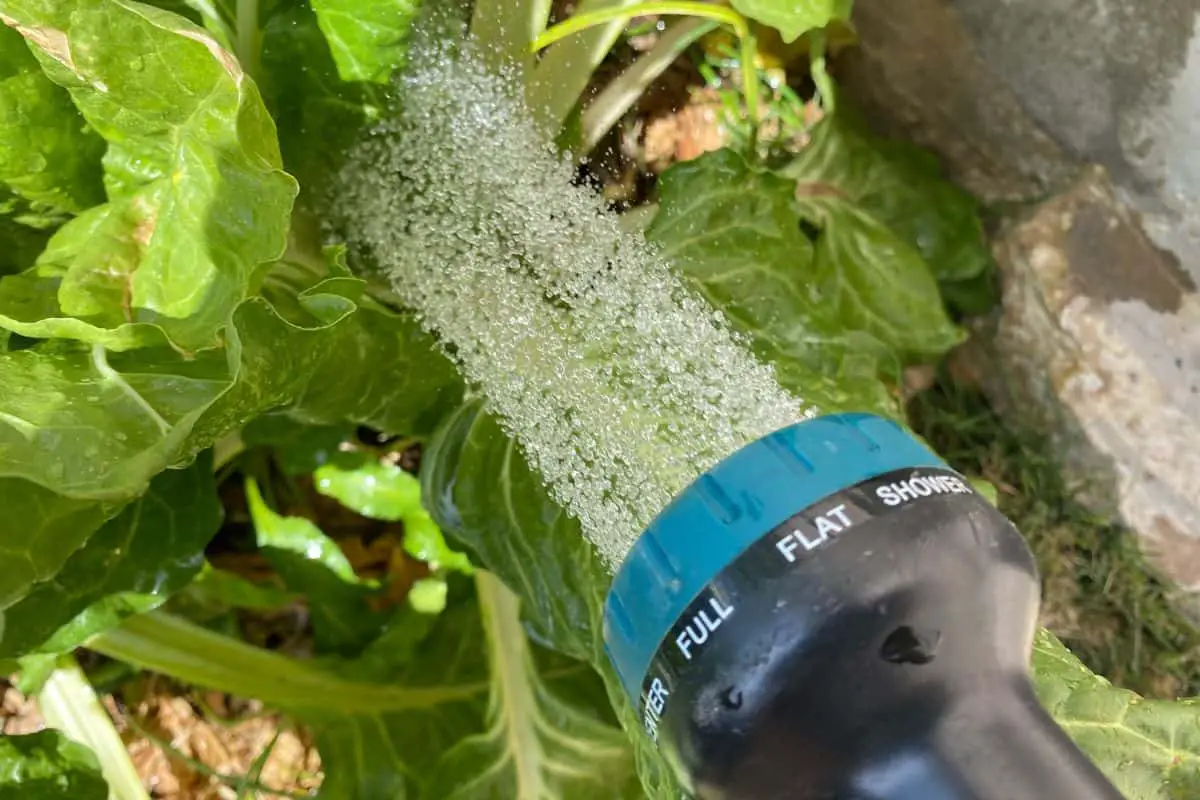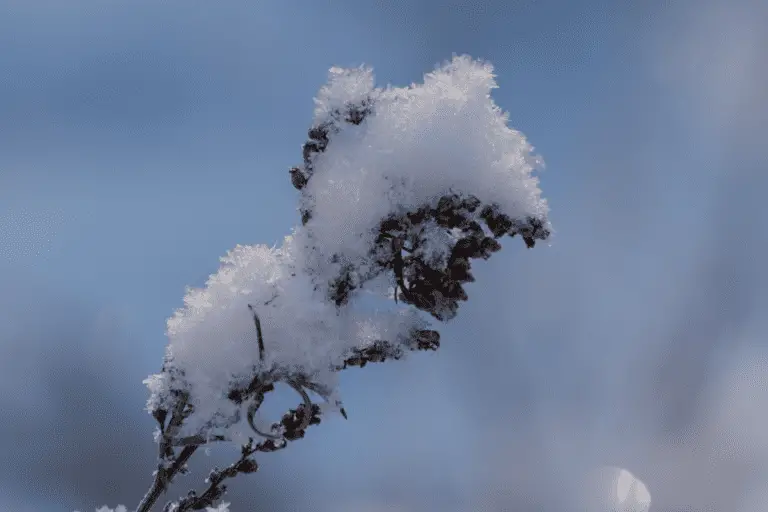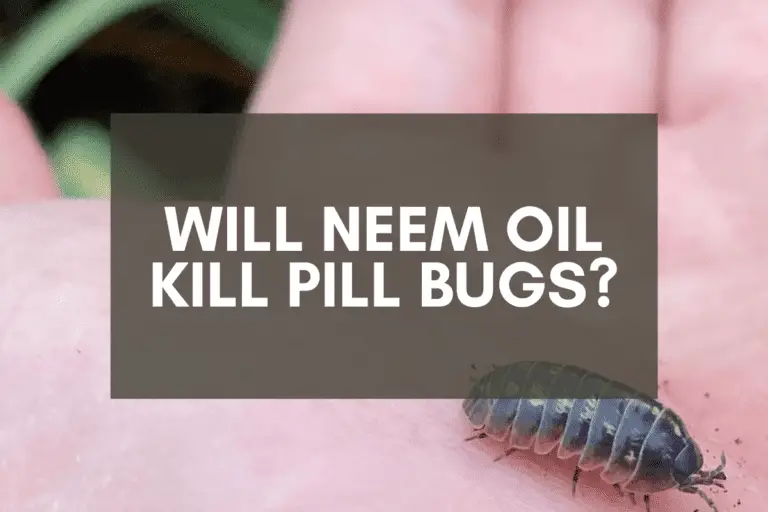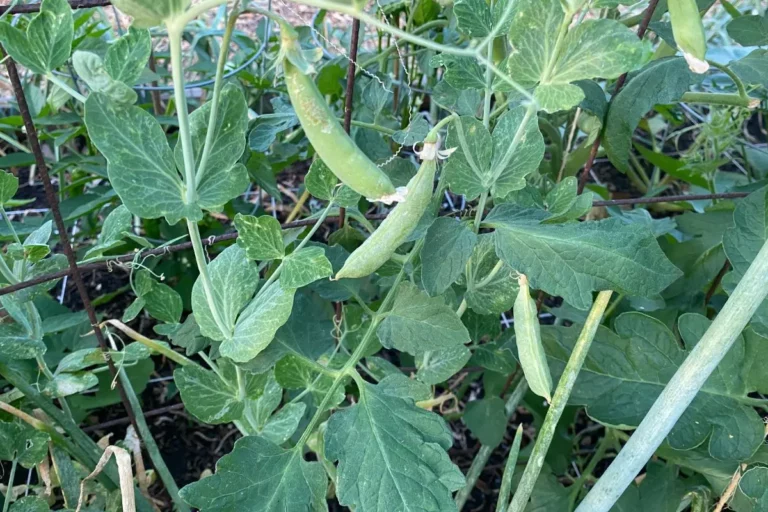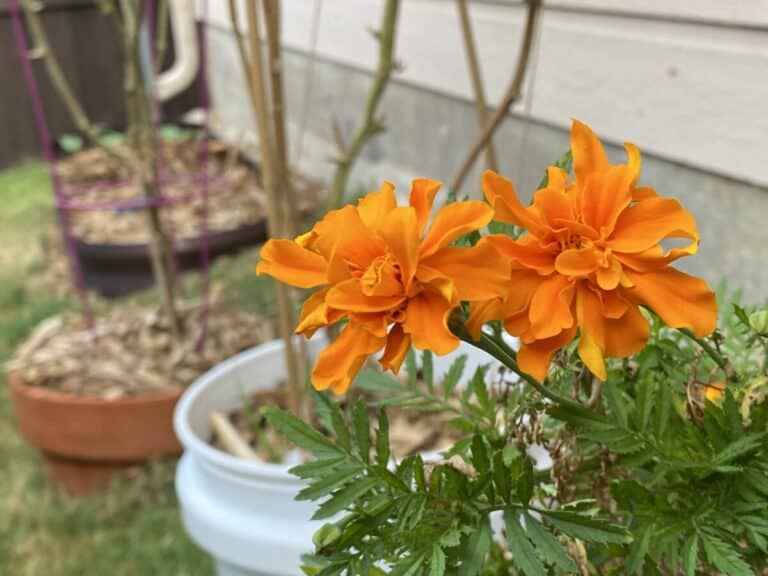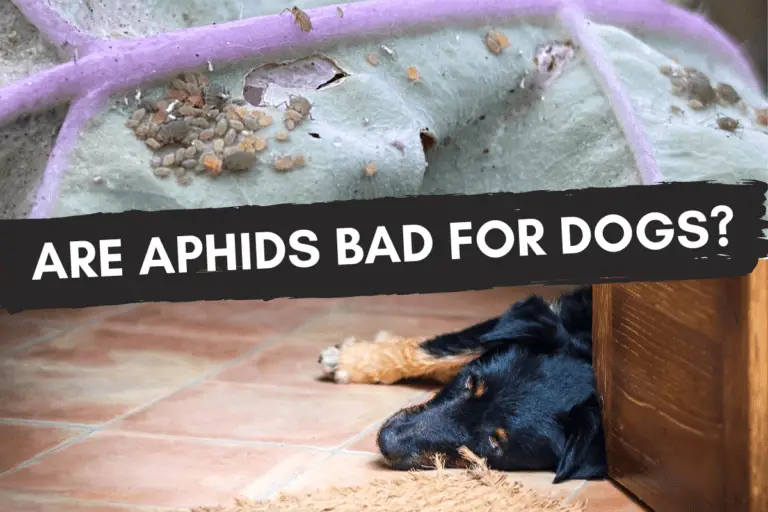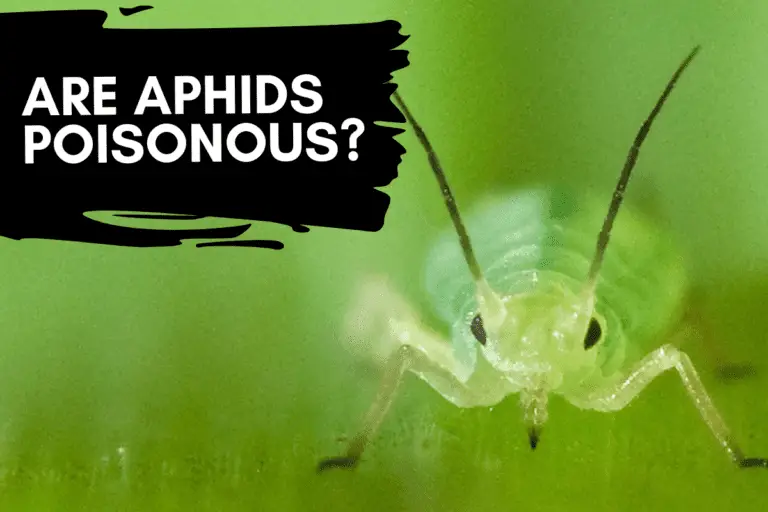Can Aphids Survive If Sprayed, Soaked, or Doused with Water?
Aphids are a practically unavoidable menace to gardeners everywhere.
There’s nearly 5,000 different species, they’re spread across all corners of the world, and they’ll show up out of nowhere to siphon nutrients out of your favorite garden veggies. Beyond a hope and a prayer, there’s little you can do to keep them 100% out of your garden, but you can attack them quickly once they arrive.
Many people recommend spraying them with water to kill them off. But does this work? Will something as simple as water take care of your aphid infestation?
Strong bursts of water can dislodge and kill off aphids, but as a general rule, water treatments alone won’t get rid of aphids and can even damage plants. Soapy water and neem oil sprays are more effective solutions, stopping aphid infestations before they spiral out of control.
This doesn’t mean that you should avoid water treatments altogether. Even after all these years of gardening, I’ll target aphids with water every so often.
What this means instead is that you should have realistic expectations about what you can and cannot do when attacking invasive aphids with water.
To help you understand what’s realistic (and what’s not), this article will look at 3 different approaches gardeners often take to attacking aphids with water as well as the upsides and downsides of each approach.
Here are the 3 methods I’ll be discussing below:
- spraying aphids with water for a water hose.
- dousing aphid infested plants with bottles or buckets of water.
- soaking aphid infested plants in water, either in the shower (for potted plants or houseplants) or shortly after a harvest (for harvested leaves and fruit only).
I’ll then share the effective strategies I’ve come up with to deal with aphids any time they arrive in my garden.
By the end of this article, you’ll know all you need to know about tackling aphid infestations before those aphids take over and destroy your hard work!
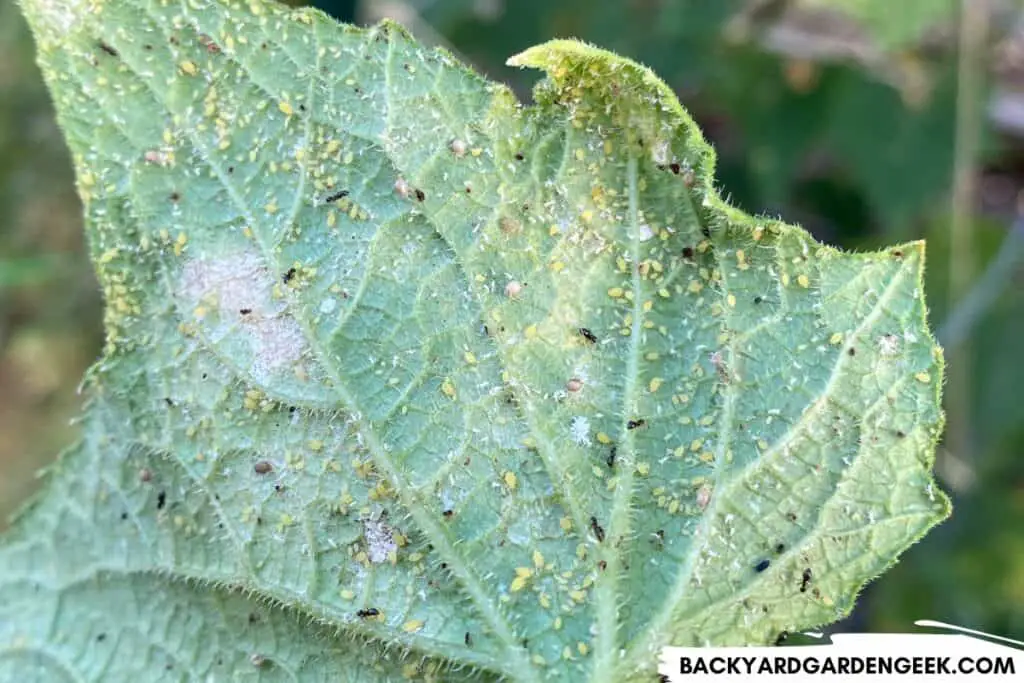
Does Spraying Aphids with Water Kill Them?
To be honest, I get a bit annoyed when I see people online suggesting that all you need to do to clear up your aphid problems is to spray the aphids with your garden hose.
I just want to ask them, “Have you ever actually tried it?”
You see, I have. Quite a few times actually. And here’s the thing: It doesn’t really work. Yeah, you’ll kill some aphids if you blast or douse your plants. You might even kill quite a few aphids. But you’re not going to kill them all. Not by a long shot.
Generally speaking, spraying aphids with water can help dislodge them from plants and may kill some of them, but it’s not a highly effective method for controlling aphids. To kill aphids, it’s best to use soapy water or insecticidal soap sprays to destroy them and prevent further infestation.
But let’s look at a few ways to use water against aphids because, under certain and very specific circumstances, it can prove helpful.
1. Spraying Aphids with a Garden Hose
When it comes to using water against aphids, this is the best way to do so. You set the hose to the “jet” or “stream” setting, aim it at the visible aphids, and pull the trigger.
What’s interesting about aphids is their ability to cling to plants even when you’re blasting them with water. I’ve had my hose a foot or two away from the aphids, spraying them with a full blast, and I’ve had to hold the hose in place for 20-30 seconds to dislodge all the aphids clinging to that one little section of plant.
If you’re looking to give your plants a bit of help, then spraying them with a hose can do so since it’ll surely kill off some of the aphids feeding there. But for this to be effective, you’d have to spray your plants 1-2 times a day, wasting lots of water in the process.
Also, you’d have to be very careful which plants you blast with your water hose. Bean plants? They’ll probably be fine. But if you blast your pepper plants with water, you’re probably going to knock some of your peppers off the plant, if not the leaves as well.
The same goes for wispier plants like spinach. If you hit your plants on the hose’s “shower” setting, you won’t hurt them, but you also won’t dislodge many aphids.
To do the latter, you’d have to use the “jet” or “stream” settings, but doing so would potentially damage your spinach as well.
In other words, spray your plants carefully, and you’ll likely help them out a bit. But it won’t take care of your problem, so please keep that in mind.
2. Dousing Aphids with Water
I’ve seen some YouTube videos where people douse their aphid-infested plants with water, and to be quite honest, I’m not impressed.
In fact, I’ve done so on several occasions–a few times with full watering cans, a couple other times with buckets–and the results have been unimpressive, to say the least.
This method is far inferior to the water hose method mentioned above. You might not think it given their small size, but aphids are remarkably clingy. Once they grab ahold of a plant and get to piercing it with their tiny mouthparts (known as stylets), they don’t easily let go.
Simply put, if you’re pouring water over your plants in the hopes of dislodging aphids, you’re in for a long, hopeless task. Sure, you’ll get rid of some aphids here and there, but the infestation won’t be going anywhere.
The remaining aphids will give birth to new aphids a day or two later, and you’ll be right back where you started.
I’ve seen a person actually put a container plant in the shower and shower with it, taking time to clean off the plant’s leaves thoroughly. That kind of dousing would be quite effective, assuming you’ve got the right kind of plant, the right kind of container, and the patience and willingness to do so.
But this isn’t something I recommend. Unless you’ve got a prized houseplant that’s infested with aphids or spider mites, It’s just not worth that kind of effort.
Long story short, don’t douse aphids with water. It’s not worth the time and effort it takes to do so, and it’s certainly not worth the wasted water along the way.
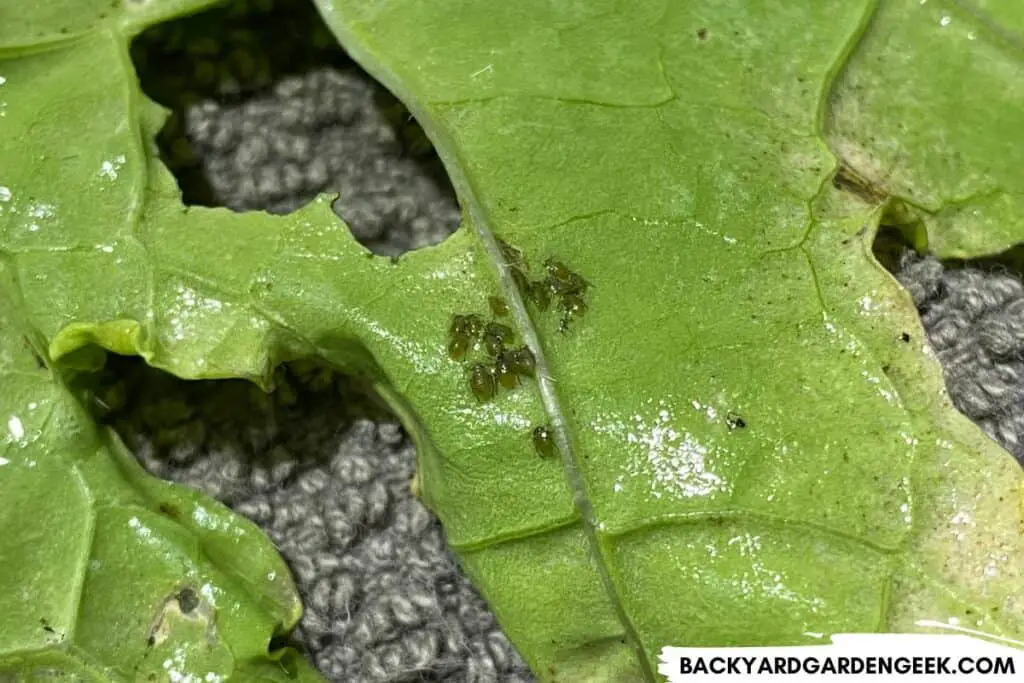
3. Soaking Plants in Water
I saw a YouTube video recently of a guy who’d realized that he’d purchased seedlings at a local garden center that had aphids on them.
(This is an easy mistake to make since aphids are adept at hiding.)
So here’s what the guy did: He filled up a tub of water, then took each seedling, turned it upside down, and carefully submerged it in the water, giving it a little shake as he did. He then took a small bucket and poured water over the plants’ leaves.
I understand why he did this, but it’s not an effective way to get rid of aphids.
I’ve actually tried this at home with some leaves that I harvested from several collard and Swiss chard plants, and the results were not great at all.
I submerged the leaves in a bowl of water, and I gave them a thorough shake, then swirled them around for a while. I pulled the leaves out, and sure enough, there were some aphids left in the water. But there were also plenty of aphids left on the plant, so many in fact that I realized how good they are at clinging to plant leave.
I put the leaves on the counter, let them sit there for a bit, then went and took another look. As far as I could tell, the aphids were still alive. I even saw a few of them slowly moving around. Despite my submerging the leaves in water and shaking them around, the aphids hadn’t budged nor died.
Here’s some simple advice: If you’ve got a plant that’s covered in aphids, don’t try to submerge it in water. That just won’t work.
But there’s one exception that I’d like to mention because you’ll need to wash off veggies that you’ve harvested from aphid-infested plants, especially if you’ve sprayed them with some of the sprays I refer to below.
But if you haven’t yet sprayed your plants with anything, and if you’ve just harvested leaves from an aphid-infested plant, do this next:
- Fill a large bowl with soapy water.
- Submerge the leaves in that bowl and let them soak for a few minutes.
- Take a soft sponge and scrub the leaves gently on both sides.
- After you’ve done that, rinse the leaves well and pat them dry with a towel.
If you follow these steps, you’ll have gotten rid of 99.9% of aphids on your harvested leaves (and probably all of them).
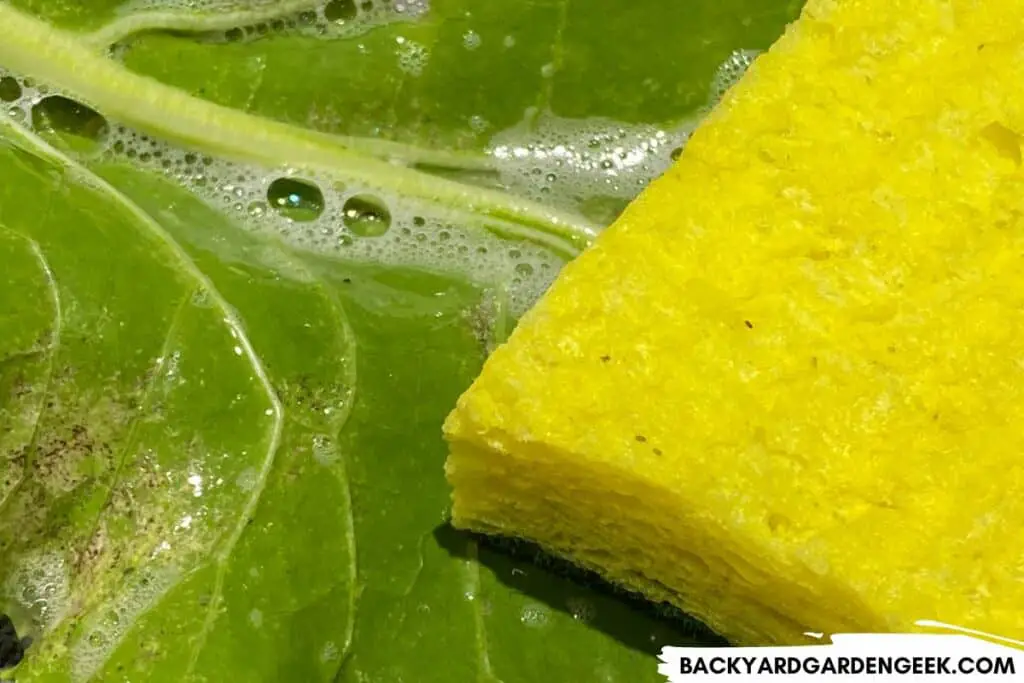
And don’t worry. If you miss an aphid or two, you won’t even notice. There’s no harm in eating them, although I know that sounds a bit gross.
But you can certainly eat produce from aphid-infested plants. Just follow the steps above, and you won’t see any aphids left on your food.
3 Easy Ways to Get Rid of Aphids
Now that you know what doesn’t work when getting rid of aphids, let’s talk about some surefire ways to get rid of aphids on your plants.
Aphids are small, hardy insects that are difficult to control with water alone, but they’re soft-bodied bugs, which means they’re susceptible to anything that’ll dry them out or damage their fragile exoskeletons.
But here’s the bad part: They can outlast cold weather and thus won’t die in winter, so you can’t ignore them if cold weather is on the horizon.
Aphids can be seen easily on plants, and you’ll want to take care of them quickly because things will only get worse once they begin attracting ants to your plants.
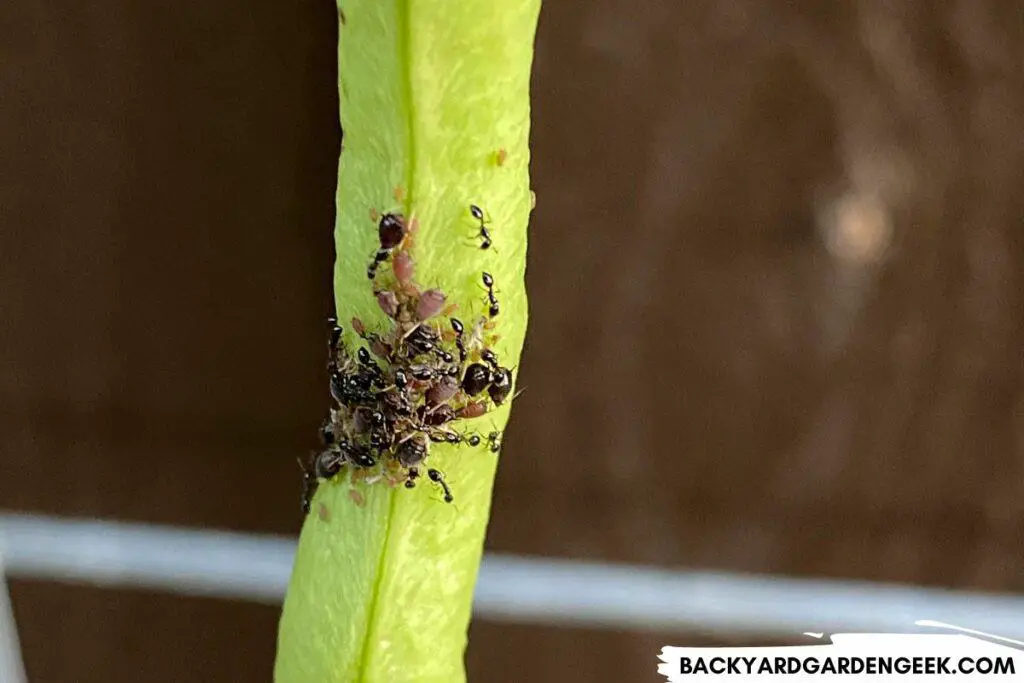
If that’s already happened to you, check out these articles that’ll explain the relationship between aphids and ants in more detail:
- Do Aphids Attract Ants?
- Do Ants Eat or Kill Aphids? 6 Environmental Factors
- Do Ants Make Aphids Worse? 7 Behaviors to Understand
- Why Do Ants Protect Aphids? 7 Things You Should Know
Let’s now take a quick look at 3 easy and natural ways to kill off aphids once they’ve arrived in your garden.
1. Soapy Water Spray
This is my go-to approach when working to rid my garden of aphids since it’s both easy to make and highly effective.
Here’s the recipe I use when making my soapy water spray:
- Fill a 1- or 2-gallon sprayer with water (3.8-7.5 L)
- Add 4-5 tablespoons of liquid soap per gallon of water (15-30 ml).
- Shake well, then spray plants thoroughly.
Please keep in mind that I make my soapy water sprays powerful on purpose, which is why I add so much liquid soap.
With this in mind, you’ll want to use a high-quality soap like Dr. Bronner’s Peppermint Castile Soap and spray your plants later in the afternoon or early evening to avoid any plant burns.
For added convenience, purchase a 2-gallon water sprayer and make up to 2 gallons (7.5 L) at a time.
Soapy water sprays won’t go bad, so I make 2 gallons at a time and simply use the spray as often as I need to until the aphids go away. That way, you don’t have to mix new sprays all that often. Simply leave the sprayer in your garage or shed when you’re not using it.
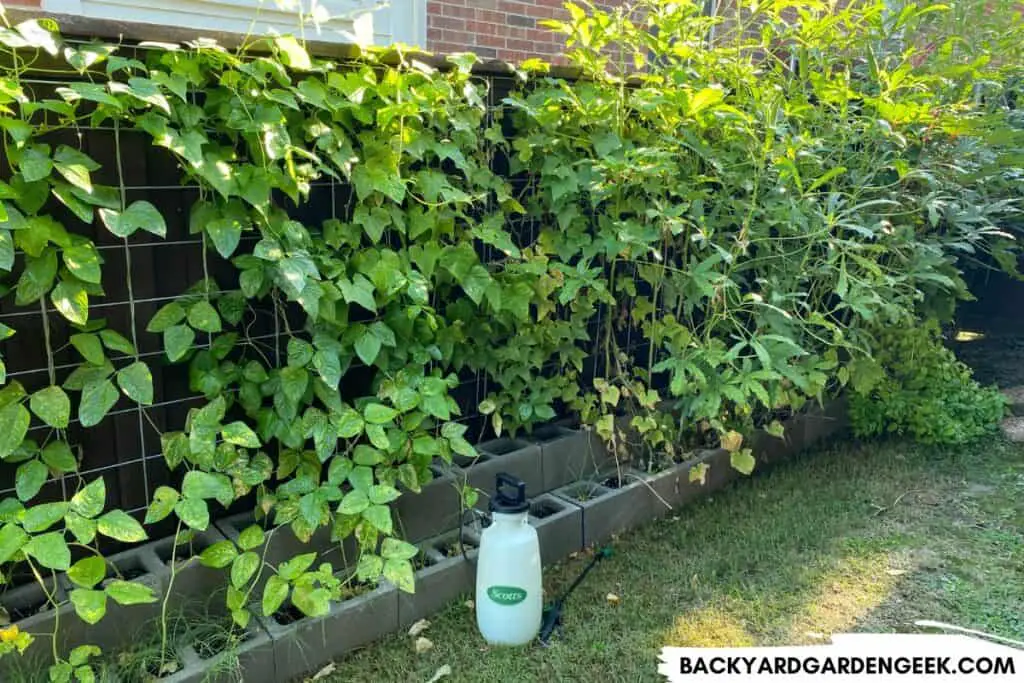
Just be sure to shake the sprayer well before each use to ensure that the soap and water are mixed thoroughly before application.
2. Garlic Soap Spray
A variation on my soapy water spray, garlic soap spray is also quite effective against aphids. To make a garlic spray to use against aphids, you’ll need a 4-5 cloves of garlic, water, and a blender or food processor.
Here’s a simple recipe you can follow:
- Peel and roughly chop all of your garlic cloves.
- Put the chopped garlic in a blender or food processor and add enough water to cover the garlic.
- Blend the mixture until the garlic is finely chopped and the water is cloudy.
- Strain the mixture through a fine mesh strainer to remove any large pieces of garlic. You’ve got to do this step, or you’ll clog up your sprayer.
- Transfer the strained mixture to a spray bottle or garden sprayer and add 1-2 tablespoons of castile soap per gallon of water.
- Shake well before each use and apply directly to any aphid-infested plants.
You can use this garlic spray as needed to repel and kill aphids on your plants. Just be sure to shake the spray bottle each time to ensure that the garlic is evenly distributed in the water.
To be quite honest, I’m not sure that my garlic soap spray is much more effective than my soapy water spray, especially when you factor in the extra time and effort it takes to make it. Generally speaking, I like both, but I prefer the soapy water spray since it’s just so convenient to make!
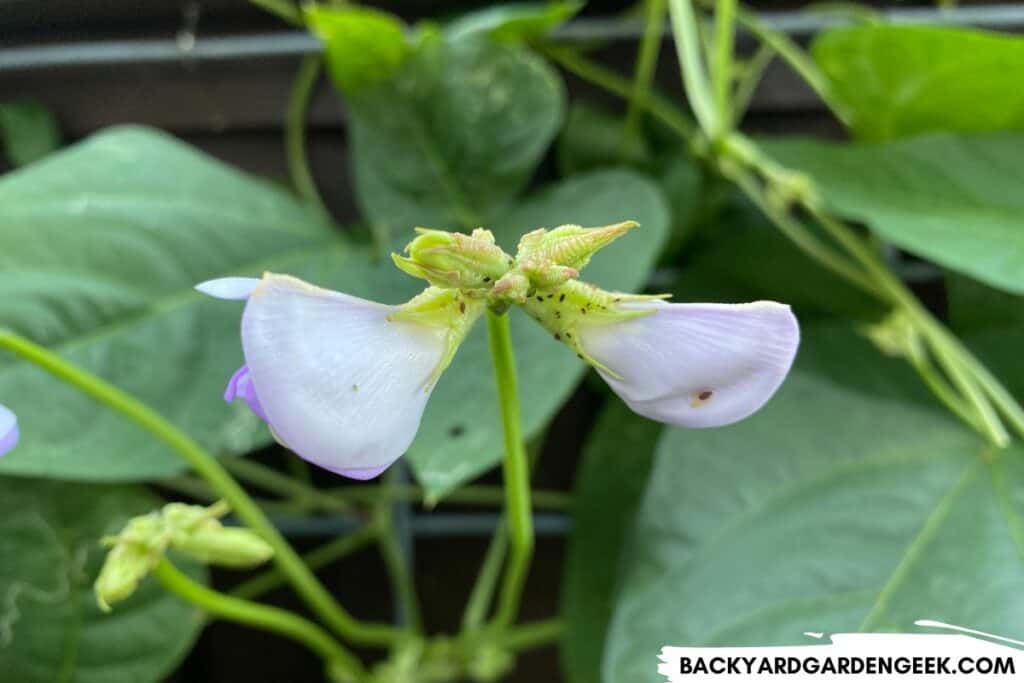
3. Neem Oil Spray
Unlike strong soapy water sprays, neem oil doesn’t work its magic immediately. Instead, its primary chemical complement (known as azadirachtin) gets ingested and then starts causing widespread biological havoc 3-4 days later.
If you want to know more about how this works, I’ve written plenty about it, so check out these articles for more information:
- How Long Does It Take for Neem Oil to Kill Bugs?
- Is Neem Oil Safe on Fruits and Vegetables? Food for Thought
- What Bugs Does Neem Oil Repel and Get Rid Of?
- Why Do Insects Hate Neem Oil? 12 Secrets to Its Success
Here’s my simple recipe for making a powerful neem oil spray:
- 1 gallon of water (3.8 liters)
- 2 tablespoons (30 ml) of neem oil. I prefer to use Verdana and Neem Bliss.
- 1 tablespoon (15 ml) of castile liquid soap. My favorite by far is Dr. Bronner’s Peppermint Castile Soap.
You’ll need to be careful when using neem oil in your garden and follow my 10-step process for making it effective.
Simply put, never spray your plants with neem oil in the morning or afternoon, since you can easily burn them. Instead, wait for the late afternoon or early evening. Once you mix the neem oil spray, be sure to use it within a few hours. And when it comes to storage, neem oil can last around 1-2 years, but you need to store it properly in a cool, dark place.
Most importantly, you’ll want to regularly inspect your plants for aphids and to take action as soon as you notice an infestation, as this will help to prevent the population from growing out of control.
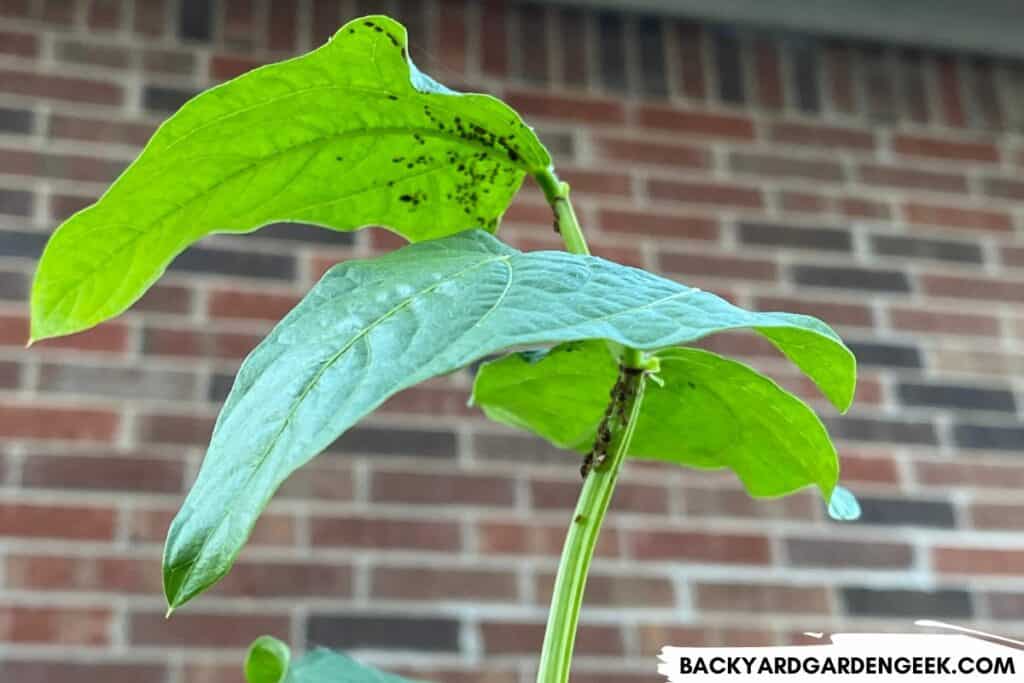
How Long Does It Take for Aphids to Die After Spraying?
In order to understand what exactly happens once you spray aphids, let’s take a look at the pros and cons of each approach because things will differ depending on which spray you use when spraying your plants.
Here’s a general overview of each spray:
Water Sprays: These will generally…
- require strong, sustained bursts from a garden hose to be effective.
- kill aphids immediately by knocking them off the plant.
- do nothing to the aphids remaining on the plant.
Soapy Water and Garlic Soap Sprays: These will generally…
- leave aphids where they are on your plants since they’re not strong enough to knock them off.
- kill aphids within a few hours by coating their exoskeletons in soapy residue.
- need to be reapplied once every 2-3 days (or even every day) since many aphids will survive initial applications.
Neem Oil Sprays: These will generally…
- leave aphids in place on your plants, much like soapy water and garlic sprays.
- kill aphids within 3-4 days as aphids ingest azadirachtin and experience biological malfunctions.
- keep killing off aphids as they keep ingesting the azadirachtin.
- need to be reapplied once per week to maintain peak efficacy.
Here’s what this looks like if we put these sprays side-by-side:
| Type | Efficacy | Prep Time | Recommendation |
|---|---|---|---|
| Water | Ineffective | 0 Minutes | Do Not Recommend |
| Soapy Water | Very Effective | 5-7 Minutes | Highly Recommend |
| Soapy Water + Garlic | Very Effective | 20-30 Minutes | Recommend |
| Neem Oil | Effective | 5-10 Minutes | Highly Recommend |
In terms of both convenience and efficacy, I suggest using soapy water sprays and neem oil sprays in tandem if you’ve got an extreme aphid infestation, alternating between soapy sprays and neem oil until the infestation has been wiped out. The only downside to the garlic soap spray is how long it takes to make; otherwise, it’s an effective solution as well.
If you want to see my detailed schedule for using soapy water and neem oil sprays in tandem, check out this post on helping plants recover from spider mites. I follow the exact same schedule when it comes to battling aphids.
Here’s the shortened version:
- Days 1-3: Insecticidal Soap Spray
- Day 4: Neem Oil Spray
- Days 5-7: Insecticidal Soap Spray
- Day 8: Neem Oil Spray
- Days 9-11: Insecticidal Soap Spray
- Day 12: Neem Oil Spray
- Days 13-15: Insecticidal Soap Spray
- Day 16: Neem Oil Spray
Please be warned: The schedule above is for extreme infestations. I don’t generally take this approach with mild to moderate infestations because I don’t want to cause any problems for my plants or any pollinators flying around my garden.
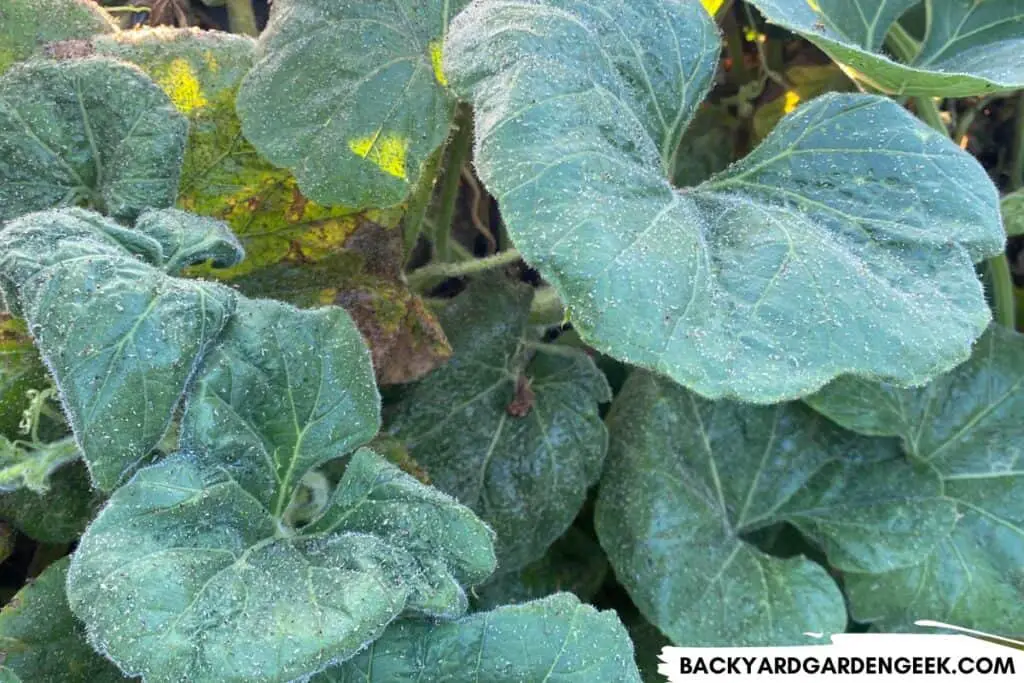
The good news is that, if used properly, neem oil sprays won’t harm pollinators and other beneficial insects.
Long story short, if you use soapy water, garlic soap, or neem oil sprays, you’re going to start killing off your aphids before they take over your garden!
More Information
By far, the best way to get rid of aphids in your garden is to learn as much about them as possible.
I recommend reading these related articles if you want to know a bit more about what you’re up against when aphids arrive:
- 21 Plants That Aphids Love to Attack + How to Stop Them
- Are Aphids Bad for Dogs? What Every Pet Owner Should Know
- Are Aphids Pollinators? A Brief Guide to Pollinating Pests
- Does Composting Kill Aphids? 4 Questions to Consider
- Reusing Aphid-Infested Soil: Should You Do It? Expert Tips
- Should I Throw Away a Plant with Aphids? Things to Consider
